Did your baby’s first tooth just come in, and you’re wondering which toothbrush is the right choice? At this very young age (likely around 4-6 months of age), you can continue to wipe the teeth and gums to clean them on most nights, but it is a good idea to start to introduce a nylon bristle brush on some nights. This will help your baby to get used to the feel of brushing, and will help you to develop a brushing method that works for you and your baby. When choosing your baby’s brush, you want to choose a toothbrush with a very small head and a curved handle. Because you will be doing the toothbrushing for your baby, the curved handle helps with ergonomics, making the job easier on you. The “banana” toothbrush (or any brush with silicone nubs, rather than bristles) does not clean adequately. Your baby can continue to chew on the banana for oral stimulation and relief of teething pain, but a brush with nylon bristle is now the right choice to optimize cleaning the collar of tissue around area tooth at the gumline (where baby tooth decay starts). Remember to lift your baby’s lip when brushing for them and brush along the gumline. As your baby gets older and grows into a young toddler, they may begin to take the brush from you and insist on doing the job themselves. Parents and caregivers still need to be brushing their toddlers teeth before bed, as toddlers do not yet have the manual dexterity to brush on their own. During this time, your toddler may want to use an electric toothbrush (if they’ve seen you using one). It’s considered safe for a toddler to use an electric brush when they are no longer biting the brush head (this development occurs at different ages for all toddlers). Research has shown that electric toothbrushes do not necessarily clean the teeth better than a manual brush, so there is no need to use an electric toothbrush- the choice to use one is based on preference. As your toddler gets a little older, they may start to idolize a certain character they see on TV. Choosing a character-themed brush may help to promote your child to accept toothbrushing more easily, so if they want one, try it! However, you still need to insist that a parent or caregiver helps brush their teeth every night. Check-in with your pediatric dentist regularly to monitor oral hygiene status and hear additional tips and tricks for brushing parts of the mouth that might be getting missed!
